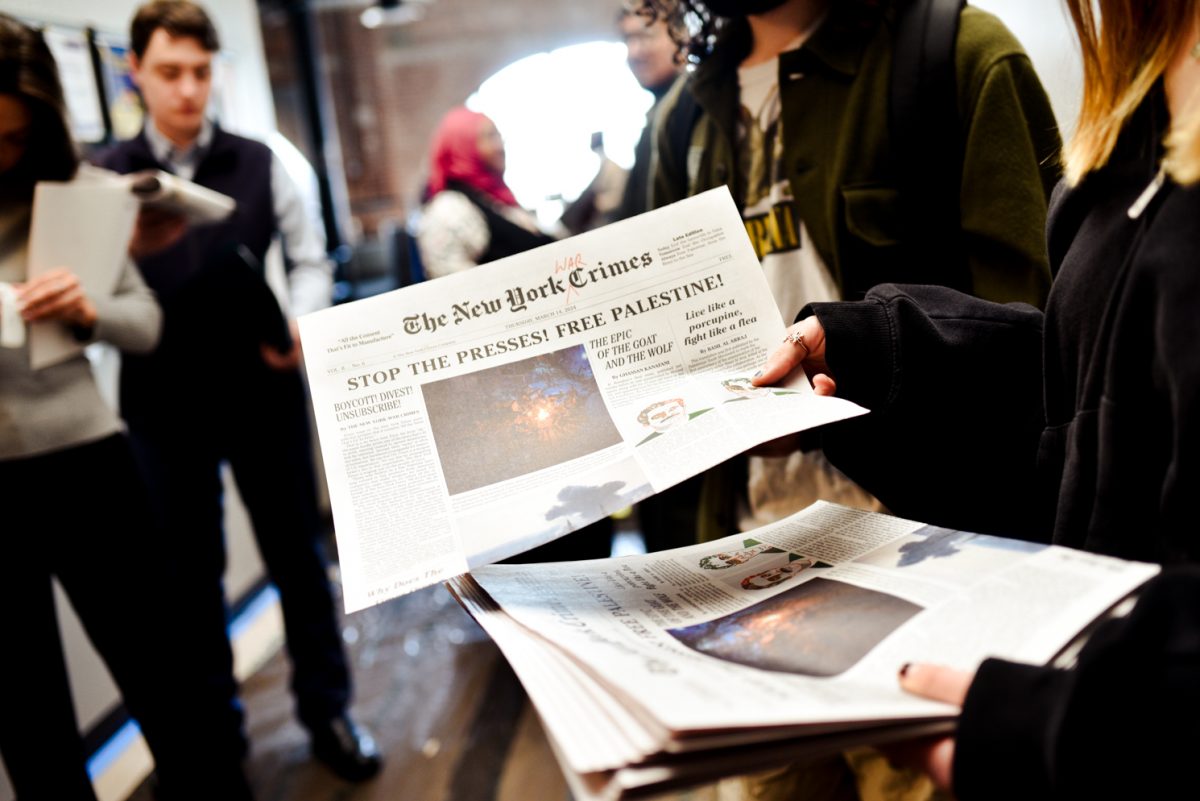Content warning: This article contains mentions of sexual violence.
A group of around 10 students protested the attendance of several major news outlets at a career fair held inside 20 Cooper Square, where NYU’s journalism department is located. Some protesters demonstrated outside the building while others entered to hand out flyers to students waiting in line to speak to publications like The New York Times, The Wall Street Journal and the BBC, calling the news outlets “partners in Israel’s crimes of genocide and occupation.”
The protesters heavily targeted the Times, accusing the publication of “racist, dishonest, genocide-apologist ‘journalism’” on fliers they distributed and passing out copies of a parody newspaper called “The New York War Crimes.” Since the beginning of the Israel-Hamas war in October, there have been multiple protests against the Times’ coverage of the conflict, including multiple that took place at the paper’s Midtown headquarters.
One student protester, who asked to remain anonymous due to safety concerns, said that a journalism faculty member escorted them and two other demonstrators out of the building after telling them that “these conversations are definitely happening in the journalism department.” The protester said the group had intended to make a “peaceful disruption.”
“It doesn’t really advance any material changes if you’re still inviting these outlets to be a part of things such as the career fair,” the protester said. “We were reiterating how our purpose was just to help people make informed decisions about who they’re going to talk to and think about who they’re going to eventually be working for.”
A January report from The Intercept found that several Times employees were concerned about the strength of the publication’s reporting on sexual violence against women during the Oct. 7 Hamas attacks, allegedly leading to the publication halting production on a podcast episode covering the topic. Since the Times’ investigation — which the paper says took several weeks and involved over 150 interviews — some family members of one of the victims included in the article, Gal Abdush, have raised doubts about whether Abdush was sexually violated.
The three reporters who wrote the original article later addressed criticisms of their reporting in another story, saying claims that Abdush’s family had “renounced” their article were false. Critics on social media have also accused some witnesses cited in the article of providing information inconsistent with previous interviews, which the reporters also addressed.
“The Times report has been challenged on social media by critics who question the reliability of witnesses cited in the article,” the second article reads. “Some also say it failed to prove that Hamas planned and directed the sexual violence, or that any of the assailants were members of the group, noting that other militants and ordinary residents of Gaza entered Israel that day too.”
The Times is investigating one of the reporters — Israeli freelancer Anat Schwartz — after she liked multiple posts on the social media platform X that “indicated a pro-Israel bias” against the company’s social media policy, including a post that “called for the Gaza Strip to be turned into a ‘slaughterhouse,’” according to the Daily Beast.
The Times’ reporting also came under fire in October, after it incorrectly attributed responsibility for an explosion at a hospital in Gaza to Israel. Israel had argued the rocket that caused the attack was a misfire by the Palestinian paramilitary group Islamic Jihad. The paper released an editor’s note a few days after its coverage of the attack, saying it had “relied too heavily on claims by Hamas” that could not be immediately verified. The Times later released a review of existing evidence, and said that “both sides deserve continued scrutiny.”
“Dozens of Times journalists on the ground are bringing readers essential war reporting, often at great personal risk,” Danielle Rhoades Ha, a spokesperson for the Times, said in a statement to WSN. “Our coverage of the Israel-Hamas war is independent, honest and unflinching.”
In November, a group of students and alumni of NYU’s Arthur L. Carter Journalism Institute wrote a letter to the department calling for it to address journalist deaths in the war. A few weeks later, journalism administrators met with students, and said the department would begin holding weekly meetings to discuss NYU’s response to the conflict.
“Our purpose was to inform students as they were coming into the NYU Journalism career fair about the misleading news that continues to perpetuate the genocide of Palestinians in Gaza, Rafah and Palestine in general,” said a protest organizer who asked to remain anonymous due to safety concerns. “Not just the genocide, but the stealing of land and the occupation.”
Spokespeople for the university and the journalism department did not immediately respond to requests for comment.
Update, April 1: This article has been updated with additional context on the Times’ reporting.
Contact Mariapaula Gonzalez at [email protected].
























































































































































